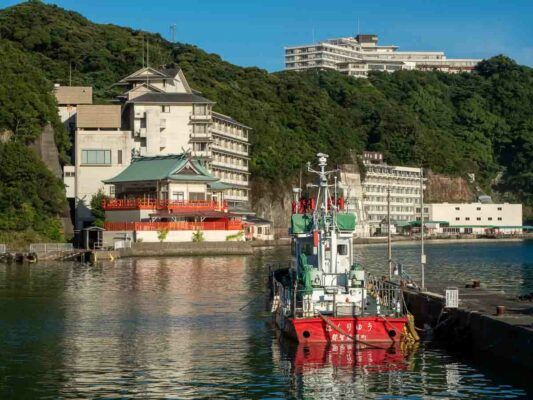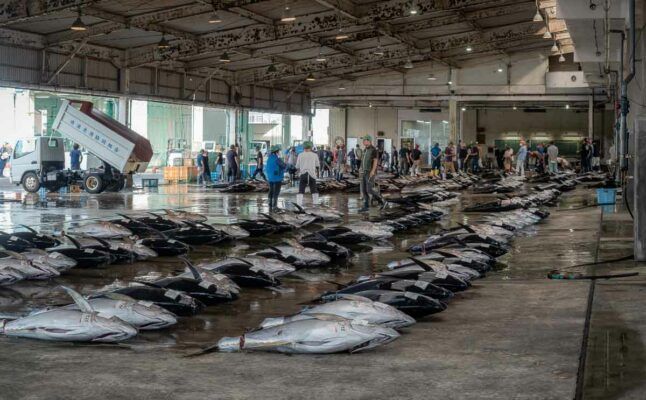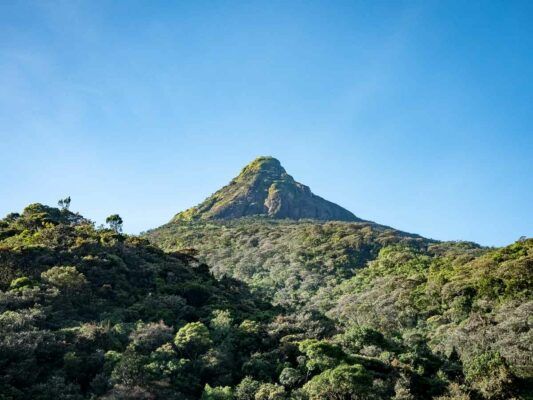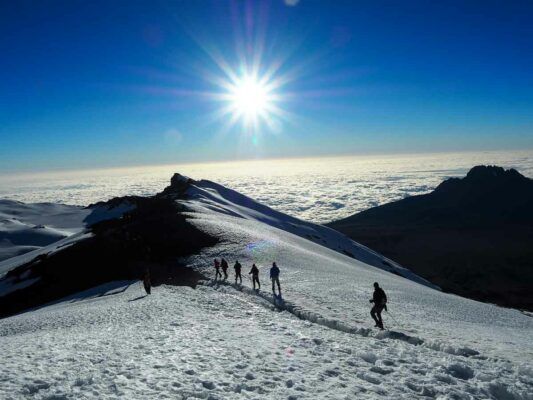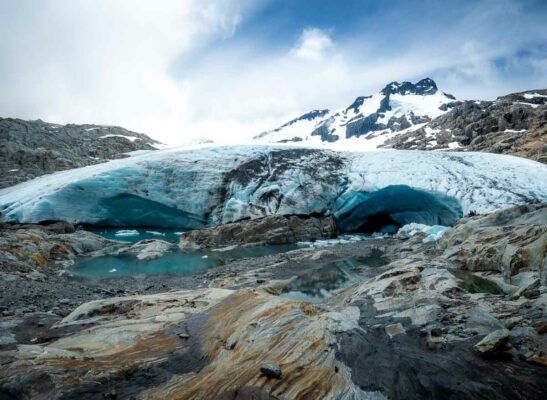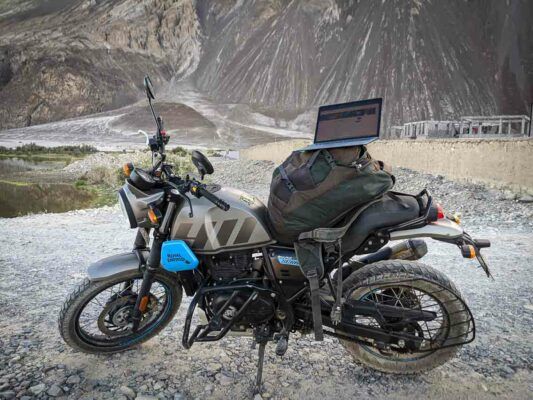No products in the cart.
Destinations, Hiking, Kilimanjaro, Travel Guides
The 7 Best Kilimanjaro Tour Operators (And Who I Used!)
I summited Mt. Kilimanjaro in 2019. But choosing the right tour operator wasn’t an easy feat. I spent several days walking around Moshi talking to the local tour companies, as well as scouring the internet (and making phone calls) – on the hunt for reliable, ethical, and professional companies that offer the best value for money.
This entire process can get frustrating quickly.. And there’s a lot of money on the line!
(Not to mention your safety)
In this post I’ll share what I found out, and my list of the 7 best Kilimanjaro tour operators (both local and international) so you don’t have to go through the same learning curve I did. Here are the 7 Kilimanjaro tour operators I recommend.
Fair Value Operators
1️⃣ Climbing Kilimanjaro [Jump To Review]
2️⃣ Nature Discovery [Jump To Review]
3️⃣ Kilimanjaro Brothers [Jump To Review]
4️⃣Altezza Travel [Jump To Review]
Luxury Operators
5️⃣Tusker Trail [Jump To Review]
6️⃣ Ultimate Kilimanjaro [Jump To Review]
7️⃣Peak Planet [Jump To Review]
Table of Contents
How To Choose The Best Kilimanjaro Tour Operator
Before we dive in, you really need some context to understand what the good operators do, and what the bad ones don’t.
Don’t Go For The Cheapest Price
The price of a Kilimanjaro climb varies widely. Operators often take into account the route, duration, group size, service level, and season. Generally, you can expect to pay between $1,500 and $6,000 per person, excluding flights, visas, vaccinations, and personal gear.
(and that yellow fever jab ain’t cheap!)
But price should not be your only criterion. Cheaper operators often cut corners on quality, safety, and ethics.
When comparing prices, vital things to look out for are airport transfers, accommodation, food, equipment, permits, guides, porters, tips, oxygen, and evacuation insurance. From here, you can customize and include any extras you feel will make your trip comfortable.
In general, there’s 3 brackets of pricing you can expect to encounter (Which our friends at Follow Alice describe this well in this article):
- Budget operators
- Fair-Value operators
- Luxury operators
Budget Operators are too cheap to be true and will offer tours for anywhere from $1400 – $1800 USD. This should raise alarm bells for you immediately. When you realise the government-enforced park fees are around $600 USD for the trek, and the remainder needs to pay for food, gas, and wages for 5 people, it’s obvious things don’t add up.
In reality, the company owner takes their fat share first, and almost none of the purchase price make it to your crew – and that’s why they are so desperate for your tip at the end.
Budget companies will offer worse food (for both you and your crew), bad gear, and cut corners wherever possible to make the trip break even.
My recommendation: avoid at all costs!
Fair-value operators operate in the happy middle and this is what I decided to go with on my trip. You can expect to pay anywhere from $1800 – $3000 USD for this type of experience which will vary mainly by group size, inclusions, and the route selected.
They pay their staff fairly, and don’t scrimp on the basics like food, gear, and safety equipment – but they also don’t go overboard as well
You’ll get the best experience and peace of mind by choosing a fair-value operator like the ones I’ve listed below.
Luxury operators are there to make you climb the most memorable experience of your life. Costing upwards of $3000 USD, these companies pride themselves on top-quality food and equipment, guides that are fluent in English, and everything included to make your trip a success.
They even bring their own toilet and shower.
(I had to mop myself clean with a sock each night)
And wine!
(I may have invited myself in for a drink)
In my opinion the extra cost of these luxury operators isn’t really justified in the quality of service. Just like flying business class, sure the foods better.. but not $3000 better. BUT the selling point here is these companies do produce a higher success rate. That is, you’re more likely to successfully summit with a luxury operator.
Flexible Route Options

There are seven official routes on Kilimanjaro, each with its own advantages and disadvantages. Some are more scenic, some are more crowded, some are more difficult, and some are more expensive. The route you choose will affect your chances of reaching the summit and your enjoyment of the climb.
I chose the 8-day Lemosho route, which was fairly easy to conquer. But I also trainined before climbing Mt. Kilimanjaro and it helped immensely. Be honest about your fitness levels and pair this with your preferences and budget.
They Advertise Their Success Rate
The summit success rate often serves as an indicator of the company’s quality, safety, and professionalism.
But these can be subjective and misleading. Different operators may have different definitions and methods of calculating it.
Some may only count the climbers who reach Uhuru Peak, while others may include those who reach Stella Point or Gilman’s Point. Which are lower but still considered part of the summit.
Others can inflate their rates by excluding the climbers who drop out before the final ascent, or by choosing easier routes and larger groups.
It doesn’t hurt to ask the operator how they measure their success rate, and what factors affect it.
They Are All About Safety
Not only is the mountain rugged, but the steep ascent can lead to many challenges, like altitude sickness, hypothermia, dehydration, and injury. Go with a company that prioritizes your health and well-being, and that details necessary equipment, training, and protocols to deal with any emergency. A few measures to look out for include:
- How they carry and administer oxygen and medication if needed
- Their evacuation measures
- What their insurance covers
How They Treat Their Guides and Porters
This crew is the backbone of any Kilimanjaro climb. They lead, support, share their knowledge and skills, and assist you throughout the journey. In a nutshell, they can make or break your experience.
Choose an outfitter that employs qualified, experienced, and friendly guides and porters. Ideally, choose one that’s a member of the Kilimanjaro Porters Assistance Project (KPAP). This ensures the team is well-paid, well-fed, well-treated, and well-equipped. I also recommend you tip the porters generously at the end of your climb.
Their Pledge To Sustainability and Ethics
The mountain is a precious ecosystem. I recommend you opt for an operator that respects and preserves the environment. Even better if they support and empower the local community. Most companies are affiliated with sustainable bodies and these are often mentioned on their website. If not, you can drop a call or email and enquire about how they adhere to the principles and standards of responsible tourism.
The 7 Best Kilimanjaro Tour Operators In 2024
Below are my top 7 choices for tour operators on Kili. I’ve broken the list up based on what you might be looking for on your journey, such as a premium experience, a good budget operator, or one that puts ethics and sustainability are the forefront.
Note: The companies listed below are either ones I’ve used, or that people I know have used and have found to be good.
1. Climbing Kilimanjaro (The one I used)

I summited Mount Kilimanjaro with the help of Climbing Kilimanjaro., and I can’t recommend them enough. They’ve been guiding tours since 2009, offer amazing customer service from start to finish, and tick all the boxes for a fantastic trip. They’re reliable, ethical, professional, and affordable.
Highlights
2. Nature Discovery

Nature Discovery is based in Arusha, Tanzania. It’s one of the most ethical operators and has been operating since 1992.
3. Kilimanjaro Brothers

Kilimanjaro Brothers is a local company based in Moshi. It’s run by 2 brothers who are both experienced guides and climbers, and they’ve been operating since 2013. They pride themselves on smaller boutique tours and boast a 98% success rate (which is really high!).
4. Altezza Travel

This company is headquartered in Tanzania and boasts over 10 years of guiding adventurers. They are a medium-sized company that’s deeply vested in responsible tourism.
5. Tusker Trail (Best Luxury Operator)

This is a US-based company with budget-friendly and premium packages. They have been operating since 1977, and they offer luxury and safety services for climbers of all levels.
6. Ultimate Kilimanjaro

Ultimate Kilimanjaro is based in the US and has been operating since 2008.
7. Peak Planet

Peak Planet is based in the US and has been offering adventures since 2008. They’ve won Trip Advisors travellers choice award, and are one of the few companies offering a crate camp option (if that’s something you want to do)
Who To Avoid When Booking A Kilimanjaro Tour:
While there are many good tour operators, there are unscrupulous ones you should avoid at all costs. Here are some signs that a company is untrustworthy or unreliable.
1. Lack of Information
A detailed itinerary with daily activities, timings, and distances is crucial. Be wary of vague descriptions or missing information. Also, when the operator provides vague responses to inquiries, it’s a potential indicator that they’re disorganized or you might have trouble during the climb.
2. Questionable Credentials: Check For KPAP Certification
Lack of a website, physical address, or even basic contact details suggests illegitimacy.
Choose an outfitter that that’s a member of the Kilimanjaro Porters Assistance Project (KPAP). This ensures the team is well-paid, well-fed, well-treated, and well-equipped.
3. Questionable Prices (And A Lack Of Transparrency)
Operators offering budget-friendly packages are widely available, but be wary of those offering ridiculously low prices. This usually translates to a compromise on quality and ethics
There’s often two pricing strategies employed on the mountain; an all inclusive trip where tipping is NOT expected (less common) and a costs only trip where your tips are the bulk of your crews wages at the end of the hike.
Beware: watch out for operators that make it deliberately confusing on how much to tip. Good companies will tell you what a standard, low and high tip rates should be BEFORE you depart so you don’t feel guilted into overtipping at the end!
4. Safety and Professional Concerns
Climbing the mountain is a challenging task on its own. So trying to conquer it with inexperienced guides and porters poses serious risks. If the company doesn’t mention any safety features (on the website, email, or phone call), don’t book a tour with them.
Kilimanjaro Travel Planning Cheatsheet
🚑 Should I buy travel insurance for Tanzania?
100% YES! — Tanzania has now introduceed “free” healthcare but it’s only for citizens! Tourists need travel insurance in case anything happens on your visit. Also be aware many policies won't cover high altitude hiking as it's a high risk activity!
(that's right, check the t&c's on your complimentary credit card insurance)
I highly recommend World Nomads as you can get specific add-ons for high altitude hiking UP TO 6000m (Which most travel insurance companies don't offer!)
🎫 Do I need a visa for Tanzania?
Probably not — Tanzania now provide a visa on arrival (VoA) for most western countires which allows you stay for up to 90 days. However, some other countries do need a pre-approved eVisa (check here!). VoAs cost $50 USD for a single entry - Note, US Citizens are required to get a Multi-Entry visa which costs $100 USD. (View visa prices here)
If transiting through Kenya (a lot of people fly via Nairobi), you'll need a Kenyan visa too. Visa's cost $20 for a 3 day transit visa and $50 for a toursit visa
(By the way, on both my interactions with the imigration officers in kenya they tried to scam me, so know what your obliged to pay and BRING THE EXACT CASH for the visa!)
💉Do I need any vaccinations for Tanzania?
YES! Make sure you are up-to-date with all your vaccines. Common travel vaccines include Hep A/B + Typhoid, and Diphtheria + Tetanus.
A yellow fever vaccination isn't a requirment to visit Kilimanjaro but is for neighbouring areas in East Africa. In reality, you will might not be allowed back into your home country on your return (I was asked for proof of vaccination upon returning to Australia) so getting this jab prior made for good peace of mind.
Rabies is an issue in Tanzania but the vaccine is expensive and ineffective as a preventative measure (it only lasts a few years and you'll need to get them again if you require treatment). If bitten by a stray dog seek immediate medical attention!
As always, talk to your GP or specialised travel doctor a few weeks BEFORE you leave.
🏩 What’s the best Kilimanjaro Tour operators?
Your only realy two options here are Kumano Travel and Booking.com. Its a complicated process so I wrote this guide here on the best kumano kodo accomodation options
If you don't want to figure it all out (it's meant to be a holiday after all) you can book a package tour. Here are my recommendations for both guided and self-guided.
💸How do you pay for things in Tanzania?
Cash is king in Tanzania, so you'll want to get some folding tender out from an ATM when you land. Larger businesses and hotels will take Debit / Credit Card but most resturants, and street vendors want cash. I even had to pay for my Kili trip in cash!
I personally use a Wise debit card for all my international money needs as they only convert the funds when you make payment, plus they offer a much better spread (margin on the true exhange rate) than the banks do. They work in all the Tanzanian ATMs I tried.
🚌 What's the public transport like in Tanzania?
There is a good basic network of local and inter-city busses in Tanzania and travel this way is very cheap. Domestic flight are also very affordable and a far more comfortable option. Checkout Busbora for booking bus tickets online.
📲 How do I get internet/data/wifi in Tanzania and on the mountain?
This one needs a whole nother article, but the short version is prepaid SIM cards are cheap and availible to tourists and locals alike (You don't need a pricey tourst SIM!)
Your cheapest option is buying a physical sim card on the street corner once landed and getting the shop assistant to help you set it up. I went with Vodacom and had generally good coverage, even up on Kili!
Another option if you're visiting other African countries is the Nomad eSIM. This is a little more expensive but gives you connectivity across 14 neighbouring African Countries!
✈️ What’s the best site to buy flights to Tanzania?
For finding cheap flights, I recommend Skyscanner. Once you find the flight you're looking for, I'd then suggest booking directly with the carrier (even if it costs a few $$ more than with one of the agreggators/agencies).
💧Can you drink the water in Tanzania?
Safest not to — tap water in Tanzania may be OK (the locals drink it) but is generally untreated and not reccommended for tourists. Purchase bottled water for drinking and teeth brushing.
🏔️💧Can you drink the water on Mount Kilimanjaro?
Yes — Your tour company with ensure the water provided to you is safe to drink by either carrying in bottled water, or by treating stream water with purification tablets or by boiling it. If you want to drink water from the rivers and streams you generally can but should do so at your own risk. ALWAYS follow best practice and drink from fast flowing water as far up stream as possible. I'd also recommend a Brita Water Bottle for rehydrating on the trail safely.


